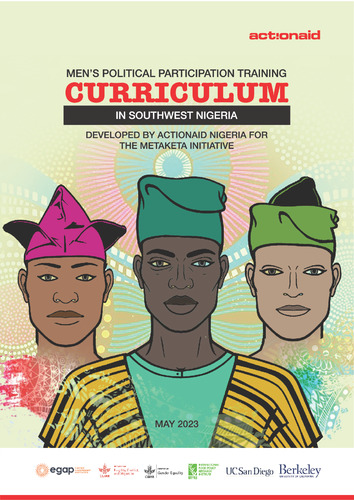Men's political participation training curriculum in southwest Nigeria
Abstract
The Metaketa Initiative is a study across 5 countries to improve women's empowerment beyond the household-including in governance at different levels. Specifically, it proposes to test whether a training intervention designed to strengthen women's sense of collective efficacy and leadership skills will improve their voice and agency in local political engagement. One of these countries is Nigeria, where the following women's training curriculum will be implemented in 3 southwestern states (Ogun, Osun, and Oyo}. ActionAid Nigeria (AAN} is partnering with Researchers from the International Food Policy Research Institute, UC Berkeley, and UC San Diego to develop and test a women's training curriculum that will help women to overcome some of the barriers to increasing their participation.
Specifically, this women's training curriculum will focus on at least five different skills areas that include:
(1} Civic education;
(2) Making common grievances over gender inequality salient;
(3) Increasing a sense of women1 s group identity;
(4) Understanding how men can support women; and
(5) Increasing perceived efficacy.
For some women, their training will be complemented by their partners receiving a men's training curriculum. The durations of all of these program elements are listed below. In all cases, the listed duration of the training session is time spent in actual activities, and is exclusive of time required to gather all participants, welcome them, provide breaks, and distribute sign-in sheets, etc. One hour will be allocated in all sessions for such administrative matters.
The men's training curriculum, like the women's curriculum, is focused on key pertinent skills areas that include: How the world is changing and how women's empowerment is beneficial; different domains of women's empowerment-from the home to the community, to the political system; the importance and benefits of women's voice and agency in public spaces; how men and boys can support women's voice and agency in public spaces; and the value of male champions/allies.

